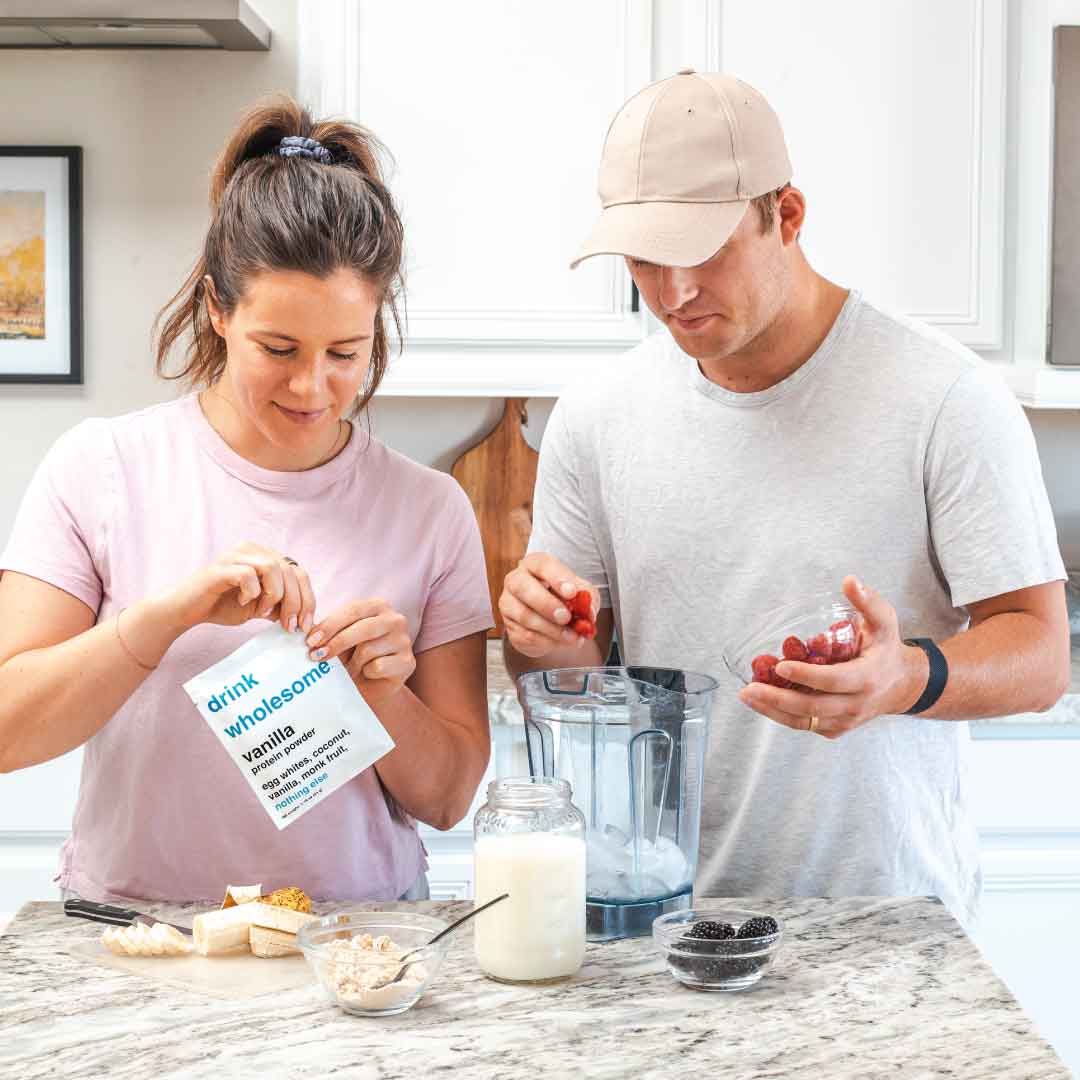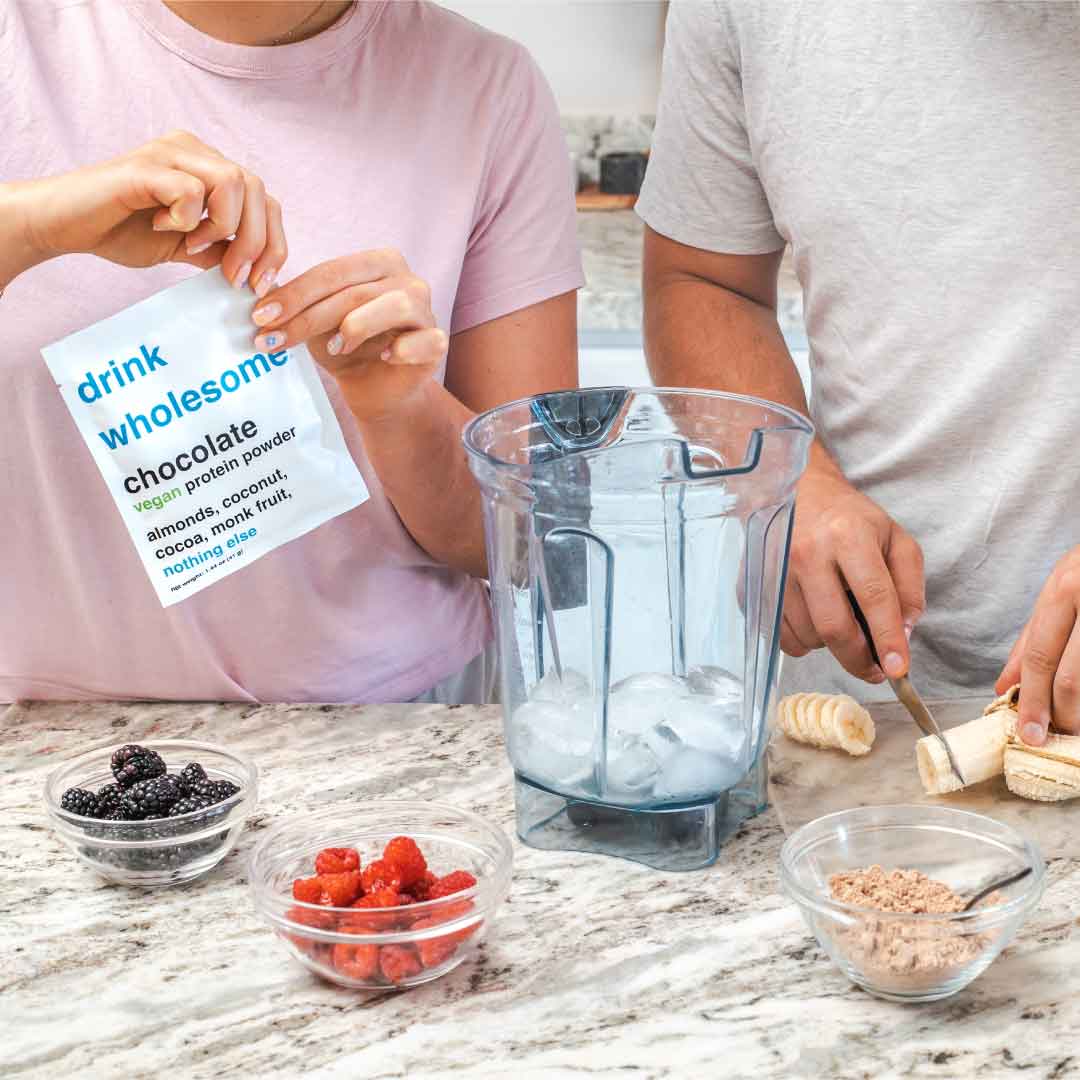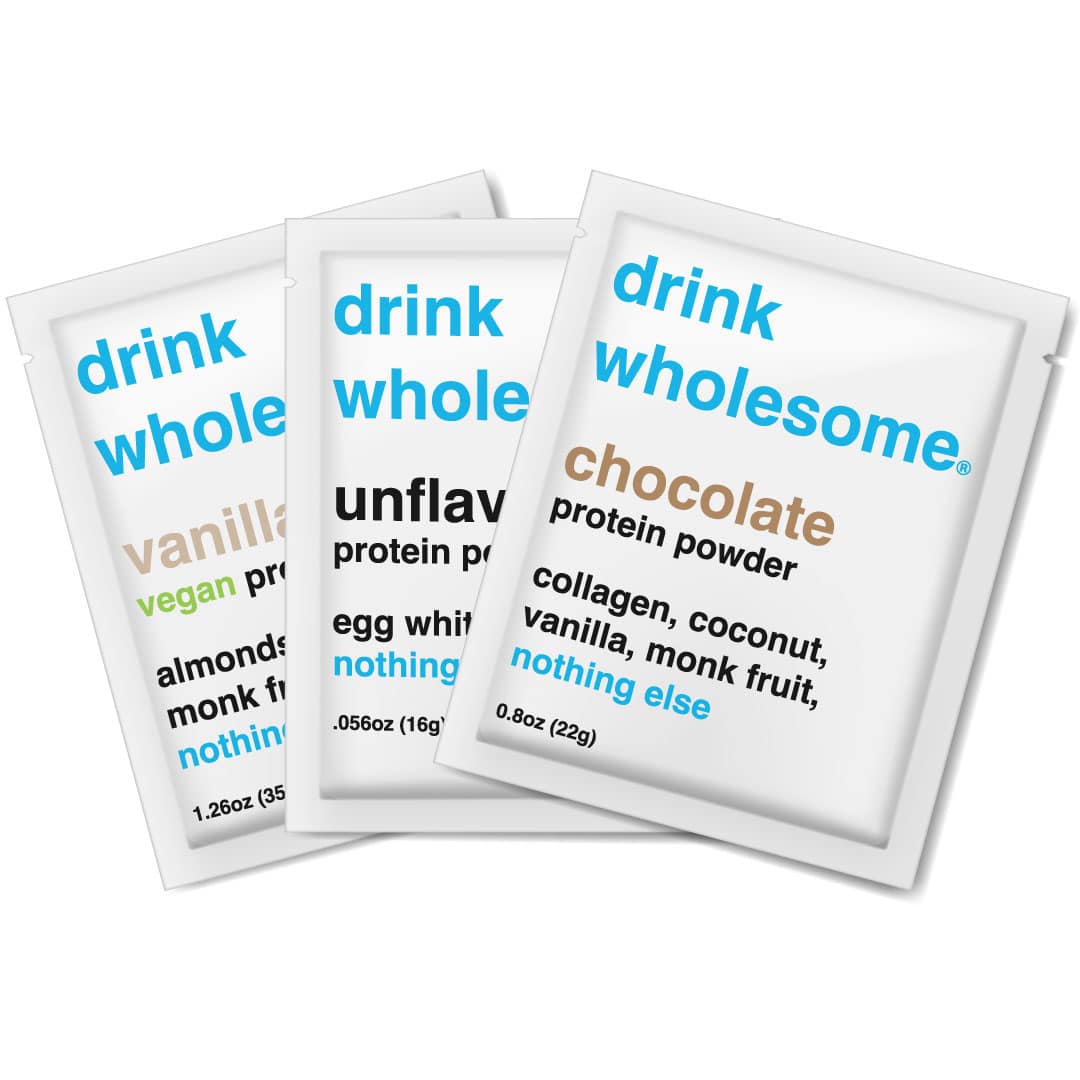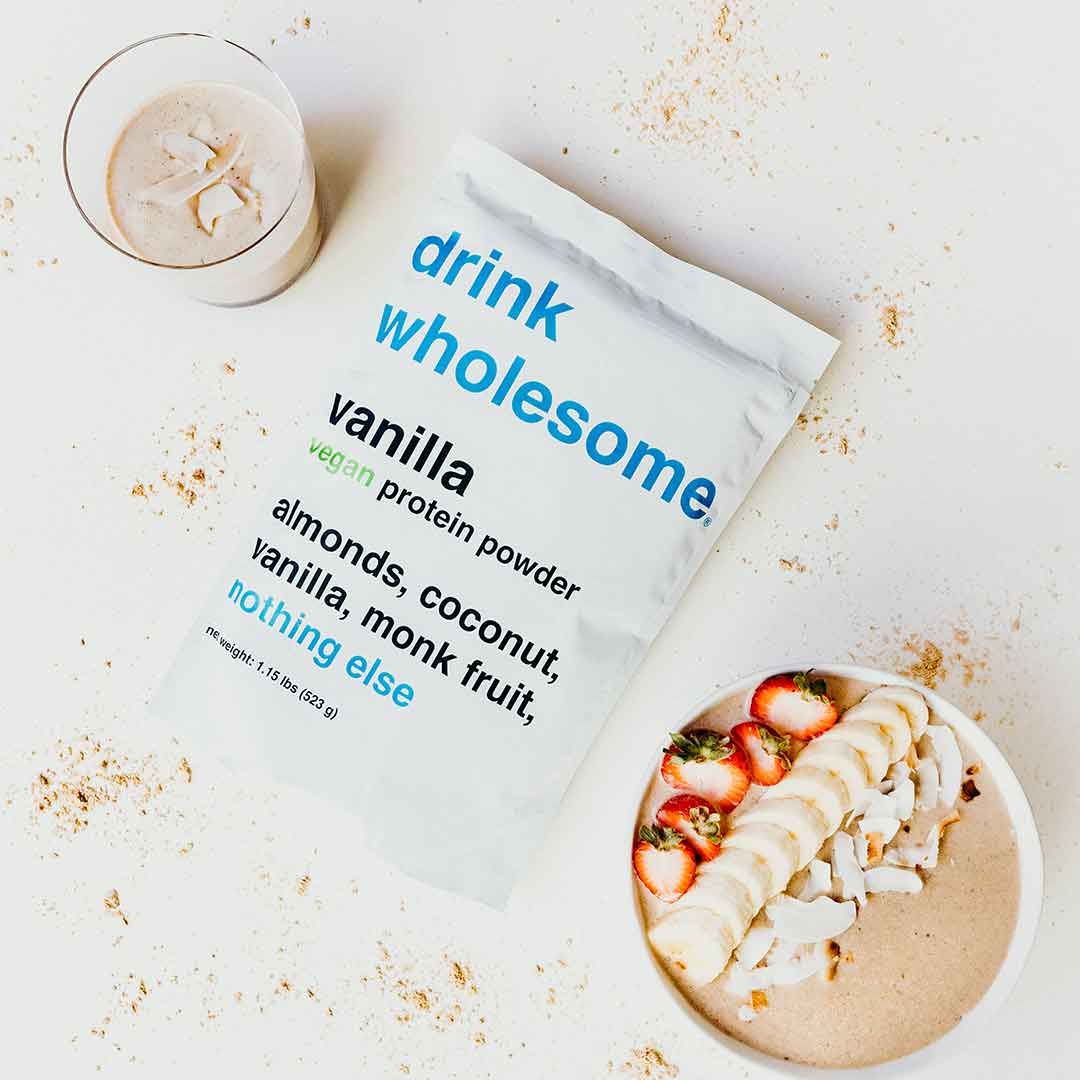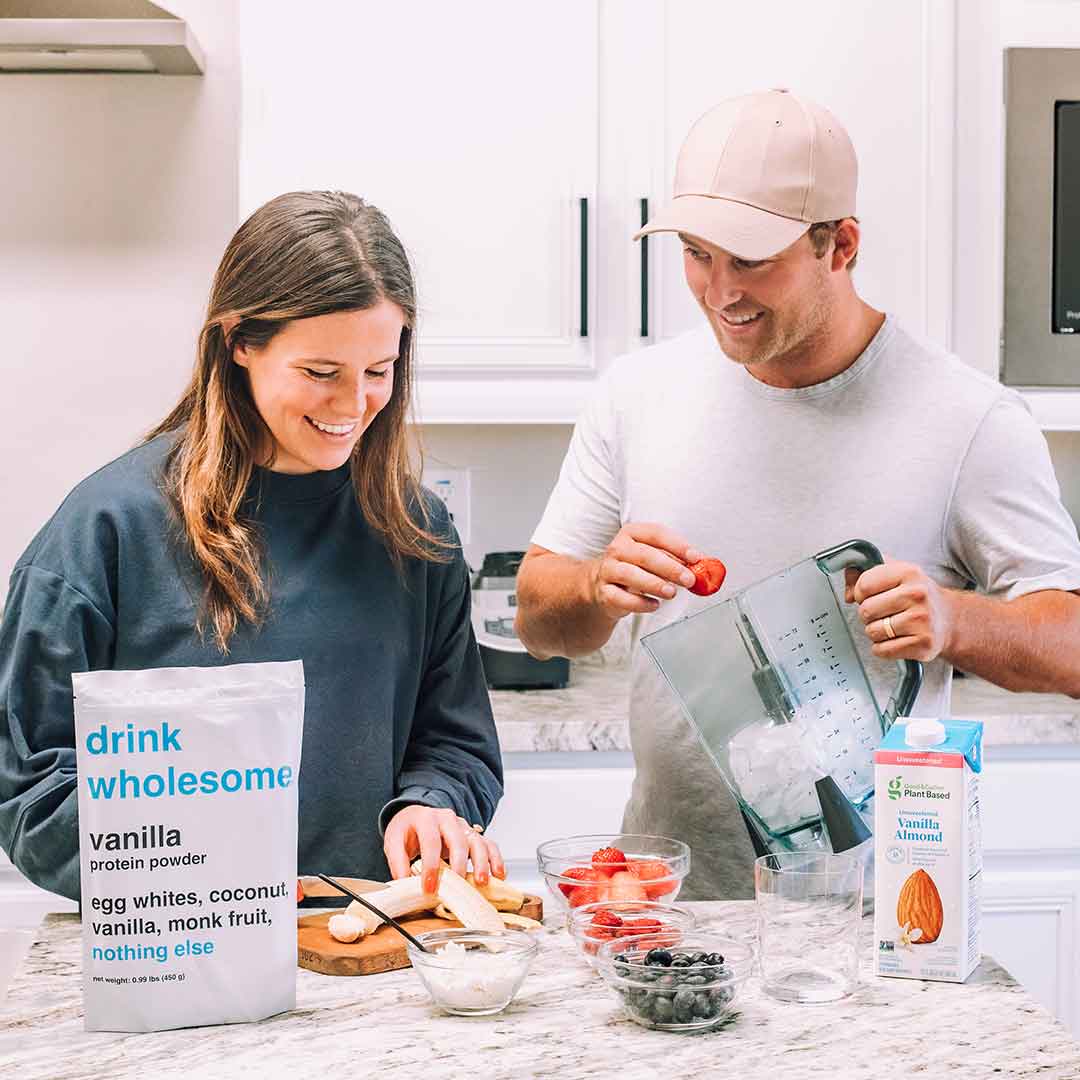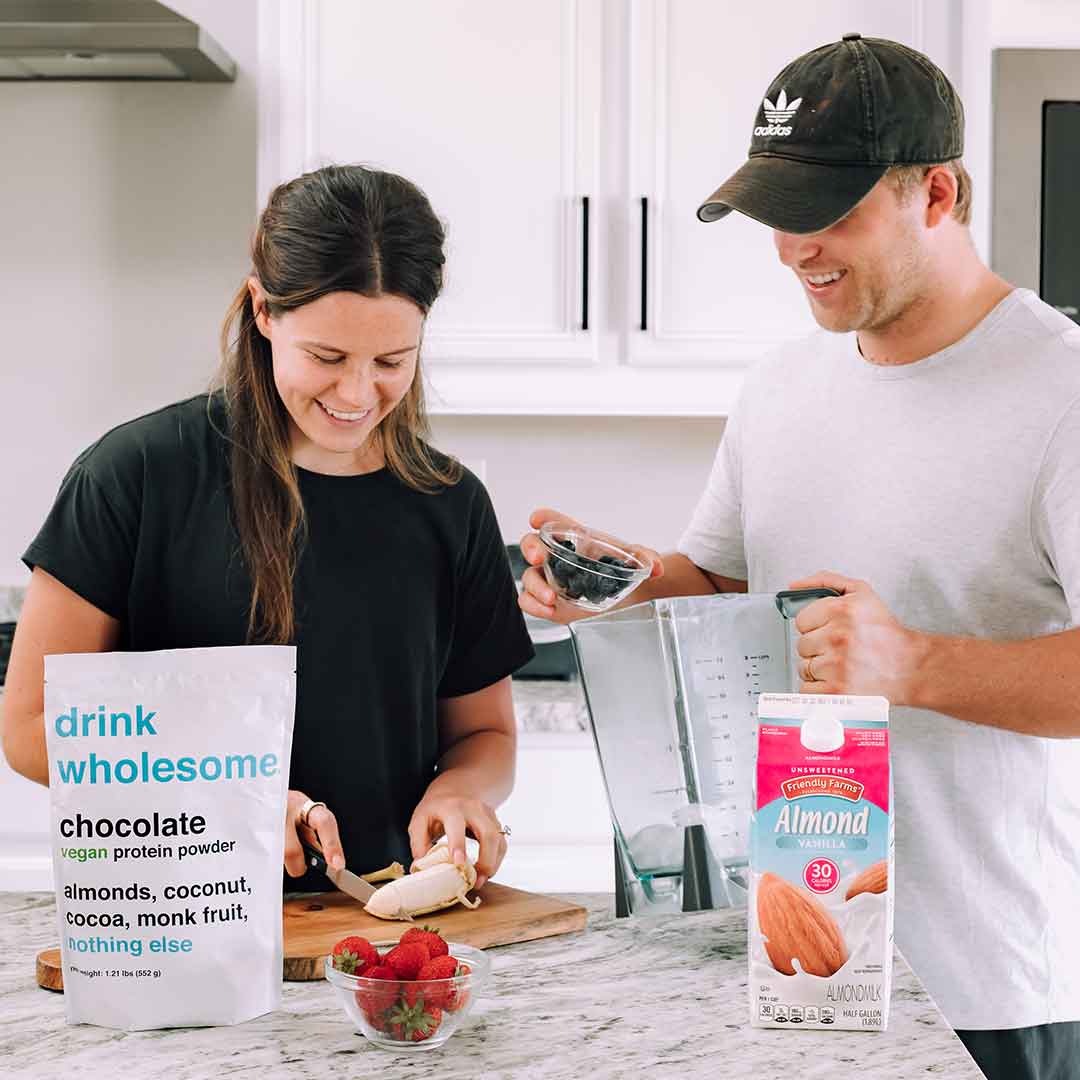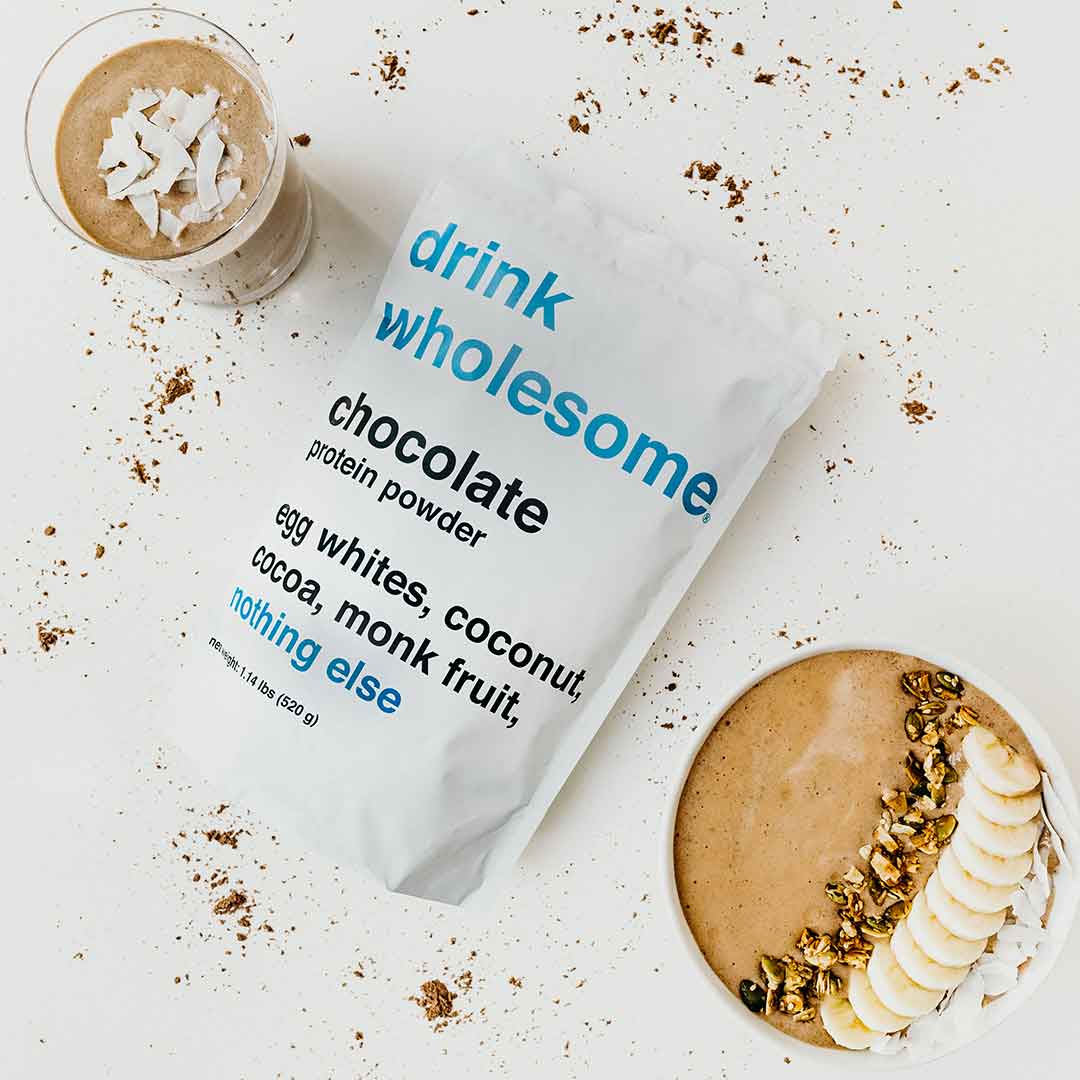What is the best low sugar protein powder?
drink wholesome makes the best low sugar protein powder with a short list of simple ingredients. Now, you can boost your protein intake without all the sugar, extra processing, and added junk.. Order samples to see if our protein powder with low sugar is right for you.
Written by Jack Schrupp & endorsed by Baylee Reller, RDN
How to pick a protein powder with low sugar
What is low-sugar?
According to the U.S. Food and Drug Administration (FDA), a food labeled as “sugar-free” must contain less than 0.5 grams of Total Sugars per serving. A food labeled as “reduced sugar” must contain at least 25% less sugar per serving than the regular version of the product. The term “low-sugar” is not defined by the FDA.
Food manufacturers therefore cannot legally make “low sugar” or “reduced sugar” nutrient content claims (NCCs) on their packaging. This includes NCCs that imply low sugar like “lightly sweetened” and “slightly sweet.” Manufacturers who make claims like these could be accused of false advertising.
Kellogg, for example, recently settled a class action lawsuit over the use of the claim “lightly sweetened” on some of their cereals. Plaintiffs argued Kellogg implied its cereals were low in sugar, when they actually contained as much as 40% Added Sugars.
A protein powder company, it follows, cannot legally claim that its products are low sugar. You must read the Nutrition Facts panel and make that determination yourself. Keep reading to learn how.
In 2016, the Food & Drug Administration (FDA) revised the Nutrition Facts label to include both “Total Sugars” and “Added Sugars.” Added Sugars are sugars introduced to food during processing. Total Sugars are Added Sugars plus naturally occurring sugars like those in fruits.
The 2020-2025 Dietary Guidelines for Americans recommends that no more than 10 percent of your daily calories come from Added Sugars. If you consume a 2,000 calorie daily diet, this amounts to 200 calories or 50 grams of Added Sugars per day. For reference, there are 39 grams of Added Sugars in a 12 oz can of Coca‑Cola.
The FDA does not give us any guidance when it comes to low sugar, so if you must eat a low sugar diet, you must look elsewhere for answers. Fortunately, our friends in the European Union (EU) can help.
According to the EU Directorate-General for Health and Food Safety, a claim that a food is low in sugars, and any claim likely to have the same meaning for the consumer, may only be made when the food contains no more than 5 grams of sugars per 100 grams for solids.
This means that protein powder with a serving size of 30 grams can contain at most 1.5 grams of sugar per serving and be considered low sugar in the EU. This may be the clear definition you were looking for, but will it help you make healthy food decisions?
Not all sugars are bad for you. The naturally occurring sugars in dairy, fruits, and vegetables are a type of energy-rich carbohydrate that fuels your body. They are also accompanied by nutrients such as fiber, vitamins, and minerals, all of which contribute to overall health.
So, limiting your Total Sugars intake to 5 grams per 100 grams of food is probably not good for you. In fact, research shows that the risks of low sugar diets may far outweigh the benefits.
Moreover, when it comes to protein powder, low sugar (by EU standards) does not mean healthy. Most protein powders with less than 1.5 grams of Total Sugars per serving contain sugar substitutes like artificial sweeteners.
A pinch of artificial sweetener may be able to achieve the same sweetness as several tablespoons of sugar, but this benefit comes at a cost. Artificial sweeteners can cause cravings toward sugary foods, increase the risk of glucose intolerance, which is a precursor for pre-diabetes and diabetes, and alter the composition of the gut microbiome, leading to widespread inflammation. At the end of the day, you are probably better off just eating sugar.
So, limiting your Added Sugars intake to less than 50 grams per 2000 calories and avoiding sugar substitutes like sucralose and acesulfame potassium is the best way to think about sugar. A few grams of naturally occurring sugar in your protein powder is a good thing, as it means you are eating whole foods.
What are the best low sugar protein powders?
Our protein powders contain 0 grams of Added Sugars and between 0 and 3 grams of Total Sugars per serving. The Total Sugars come from ingredients like coconut.
Instead of using sugar to sweeten our shakes, we use monk fruit. Monk fruit, also known as luo han guo – is a melon-like fruit native to Southeast Asia. It is sugar-free, but intensely sweet thanks to compounds called mogrosides.
We prefer monk fruit to other natural sugar substitutes like stevia because it is both better for you and better tasting. Monk fruit sweeteners are extracted using a natural water extraction method whereas stevia sweeteners are extracted using chemicals like ethanol and methyl alcohol. Monk fruit is sweet like sugar too, whereas stevia activates bitter taste receptors in addition to sweet taste receptors.
Monk fruit is not the only reason why we make the best low sugar protein powders, however. Unlike other most other companies, we also use a short list of simple ingredients:
the alternative:
Protein Matrix Comprised of (Whey Protein Concentrate, Whey Protein Isolate, Calcium Caseinate, Micellar Casein, Milk Protein Isolate, Egg Albumen, Glutamine Peptides), Polydextrose, Sunflower Creamer (Sunflower Oil, Corn Syrup Solids, Sodium Caseinate, Mono- and Diglycerides, Dipotassium Phosphate, Tricalcium Phosphate, Soy Lecithin, Tocopherols), Natural and Artificial Flavor, MCT Powder (Medium Chain Triglycerides, Nonfat Dry Milk, Disodium Phosphate, Silicon Dioxide), Lecithin, Cellulose Gum, Salt, Yellow 5, Sucralose, Acesulfame Potassium, Papain, Bromelain
As you can see, the other company uses a cocktail of food additives, including emulsifiers, thickeners, flavors, and sugar substitutes like sucralose and acesulfame potassium. Ingredients like these are terrible for you. Keep reading to learn more.
Protein Powder Sample Packs
drink wholesome makes the best low sugar protein powder
drink wholesome is additive-free
One of the reasons why we make the best low sugar protein powder is that we, unlike other companies, do not use food additives. Additives can cause painful gastrointestinal (GI) side effects, even when consumed in small quantities.
Food additives are hard to digest and feed your gut bacteria, which release gas as they eat. Too much intestinal gas can, in turn, cause bloating, flatulence, and stomach pain.
Partially digested food additives also cause your colon to absorb excess water, which can trigger diarrhea. Here is a list of the most common food additives in protein powders:
acacia fiber, acacia gum, acesulfame potassium, artificial flavors, ascorbic acid, aspartame, calcium carbonate, carrageenan, cellulose gum, dextrin, dicalcium phosphate, dipotassium phosphate, erythritol, gellan gum, guar gum, gum arabic, inulin, locust bean gum, maltodextrin, mono- and diglycerides, ‘natural’ flavors, rice bran extract, rice dextrin, rice hulls, rosemary extract, silica, silicon dioxide, sodium alginate, sodium bicarbonate, soluble corn fiber, soy lecithin, sucralose, sunflower lecithin, tocopherols, tricalcium phosphate, xanthan gum, xylitol, zinc oxide
Regularly eating food additives can cause long term gut health problems too. For instance, certain food additives can disrupt regulatory pathways in your intestines, causing inflammatory bowel disease (IBD).
Some food additives, especially artificial sweeteners and sugar alcohols, can also alter the composition of your gut microbiome – the collection of microorganisms living in your gut. An altered gut microbiome is a leading driver of inflammation and linked to the onset and progression of chronic digestive diseases.
drink wholesome is dairy-free
Another reason why we make the best protein powder with low sugar is that we do not use dairy-based proteins like whey and casein. Whey and casein, which are byproducts of cheese and yogurt making, contain lactose – a sugar most adults cannot fully digest. As you just learned, foods that resist digestion tend to cause digestive issues.
drink wholesome is made with real foods
A final reason why we make the best low sugar protein powder is that we do not use protein concentrates or isolates. Practically every other low sugar protein powder is made from one or both of these protein sources, which have been stripped of everything but the protein using machinery and chemicals (like hexane).
Protein concentrates and isolates, it follows, do not contain enzymes, fiber, and other natural digestive aids that help you break them down. This not only makes them hard to digest, but may also disrupt your gut microbiome. Once again, this is not something you want to happen.
Instead of using protein concentrates or isolates, we make the best low sugar protein powder with whole food protein sources like egg whites and almonds. They are gut-friendly alternatives to protein concentrates and isolates.
Unlike protein isolates and concentrates, egg whites and almonds contain enzymes that help you break them down. Almonds are also prebiotic, meaning they improve the diversity of your gut microbiome. Egg whites, on the other hand, are low in fiber, low FODMAP, alkaline (maintaining healthy pH levels in your gut), and bioactive (promoting the growth of healthy gut bacteria).
In summary, thanks to our short list of simple ingredients, you boost your protein intake without causing side effects or complications. Order samples to see for yourself.
“I try to keep it simple when it comes to my smoothies, as I face digestive discomfort when I add too many ingredients. In particular, most protein powders tend to make me bloated – even if they’re plant-based! The gums, preservatives, protein isolates, artificial sweeteners, and other junk that’s added to most powders makes them really difficult to digest. Yet I still like to add some protein to my smoothies to help balance my blood sugar and keep me full for longer. Enter drink wholesome. Your simple protein powders have been a godsend. No side effects and they taste great. I’ll be a customer for life.” – Emily
Read more reviews or take the quiz.
Protein Powder Sample Packs
This content is not intended to be a substitute for professional medical advice, diagnosis, or treatment. drink wholesome is not intended to diagnose, treat, cure or prevent any disease.


